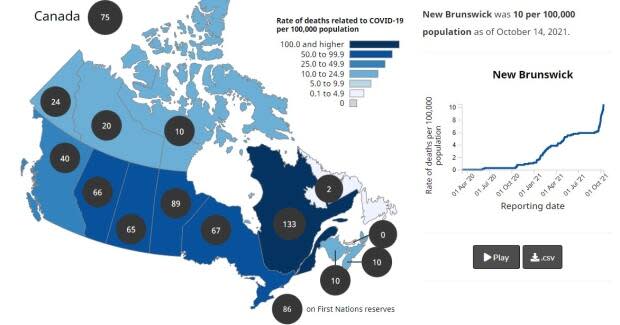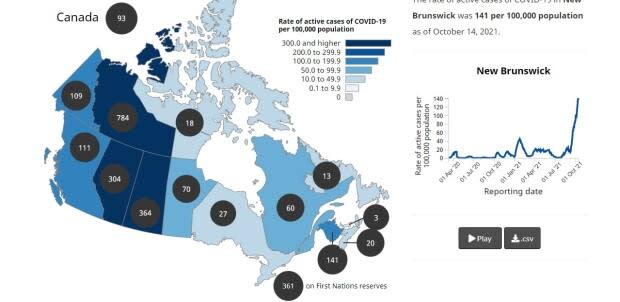One in five COVID-19 deaths were people who were fully vaccinated

A COVID-19 antibodies researcher expects to see more deaths among fully vaccinated people as vaccine effectiveness begins to wane.
"The vulnerable are becoming vulnerable again," said Rodney Russell, a professor of immunology and infectious diseases at Memorial University of Newfoundland.
He said research is showing that the effectiveness of COVID-19 vaccinations begins to fade after six or seven months. And since older and vulnerable groups were vaccinated first, they're seeing the first signs of waning immunity.
Of New Brunswick's first 84 deaths, 17 of them — or 20 per cent — were fully vaccinated. The other 67 were unvaccinated or partially vaccinated.
The Department of Health released those numbers on Friday, so it does not include deaths announced since then. The government does not indicate the vaccine status when it announces new deaths from COVID-19.
The department was asked to break down the numbers from before and after vaccinations were introduced, but it didn't.
To put the numbers in perspective, eight New Brunwickers had already died from COVID-19 before the first vaccination was given on Dec. 19.
By April 1, when shots became available to those over age 75, 30 people had died. By May 18, when the vaccine was available to all adults, 42 people had died.
Russell said he would expect that most of those who died fully vaccinated are over the age of 65 and likely had underlying health issues.

"That makes sense because their immune system is starting to wane," explained Russell.
"They would have gotten the vaccines first, back when they first rolled out ... so they've had the longest time now to have it declining in their antibody levels."
Waning immunity
Russell said it's perfectly natural and normal for a person's immunity to drop after vaccination.
At first, "the immune system ramps up and it goes into fighting mode, and it throws everything at the virus or the vaccine," he said.
But "once the battle is won" everything settles down "and the troops go back to base."
Russell said two things happen with older people that make them more vulnerable. Their bodies usually don't produce as many antibodies as a younger person, so the concentration of antibodies several months down the road may not be high enough to effectively ward off the disease when they get infected.
The other thing is that their B-cells and T-cells don't have the same memory as a younger person's. B-cells make the antibodies, and T-cells limit the virus's ability to cause serious damage.
"The answer is the third shot," said Russell, "because you tweak the immune system again and you give it a little taste with the vaccine and say, 'Look, the virus is still around." So the immune system kicks in again then and ramps the antibodies back up to where they were before."
New Brunswick began administering booster doses last week to residents in nursing homes and other communal settings who have already received two doses of a vaccine.

Russell said New Brunswick's numbers are following the same pattern as many other places.
He's also not surprised at the shifting ratio of those testing positive for COVID-19 during this fourth wave, which is largely driven by the delta variant.
Early on in the fourth wave, it was common to see the percentage of unvaccinated and partially vaccinated positive cases in the 80s, up to about 90 per cent. That's fallen in recent weeks, to a low of 50 per cent on Wednesday.
Russell said countries around the world have noticed the same thing happening. He said lessons can be learned from Israel, which was "one of the first places to really get on the vaccine bandwagon and get aggressively vaccinating."

In June, Israel began seeing more breakthrough cases of people who had received two doses of a vaccine.
"And that was disappointing. But it wasn't that unexpected because we expect the levels of antibodies in your blood will go down over time. That's normal. That always happens."
With vaccinations in Canada largely ramping up in March as doses became more readily available, it's been about six or seven months since we vaccinated our most vulnerable citizens, Russell said.
"So we're right on schedule now," he said.
Booster doses for long-term-care residents begin
Last winter, seniors in long-term care homes were among the first to be vaccinated in New Brunswick.
On Sept. 29, the province announced it would be providing the booster doses, following new advice from the National Advisory Committee on Immunization.
In its updated guidance, NACI said residents of long-term care homes, including retirement homes and assisted-living homes, "are at increased risk for COVID-19 infection because of their daily interactions with other residents and staff."
The 'nastiest variant we've seen yet'
Russell said the delta variant has really upped the ante for COVID-19.
He said it's "the nastiest variant we've seen yet. It spreads faster. It causes more illness. I mean, we're seeing more people in the hospital now than we used to before."
Throughout most of the pandemic, the number of people hospitalized with COVID-19 in New Brunswick was limited to single digits. As of Thursday, there were 63 in hospital, with 19 in intensive care, which was down from previous days.
The fourth wave has eclipsed all of New Brunswick's previous COVID-19 records. The highest number of active cases during the fourth wave was 1,092 on Oct. 13, compared with the pre-fourth-wave high of 348, which was set on Jan. 25.
The highest number of daily new cases, 140, was announced on Oct. 2. The pre-fourth-wave record was 36, announced on Jan. 17.
Of the 19 in an intensive care unit as of Thursday, 17 were unvaccinated and two were partially vaccinated.
Russell said vaccines can only do so much.
"We knew the vaccines weren't 100 per cent," he said.
"The reason we're seeing so many vaccinated, mostly older people getting infected now is because they think they're safe," said Russell.
Anyone over the age of 65, even if they got two shots of vaccine, should pretend they're not vaccinated.
"If you can't get a third shot, then you need to act like you haven't been vaccinated because you may not be protected," said Russell.

